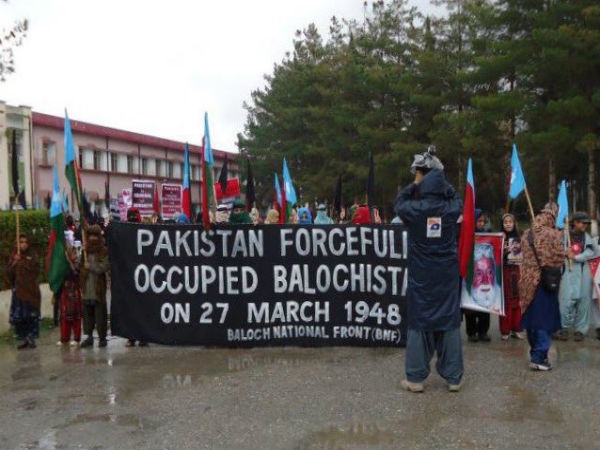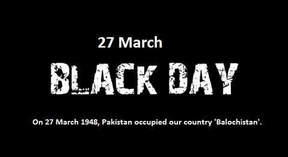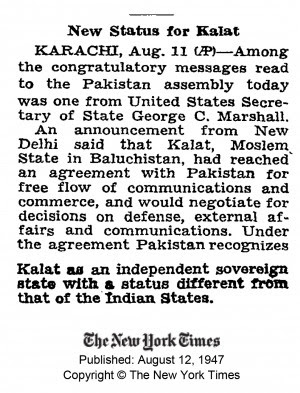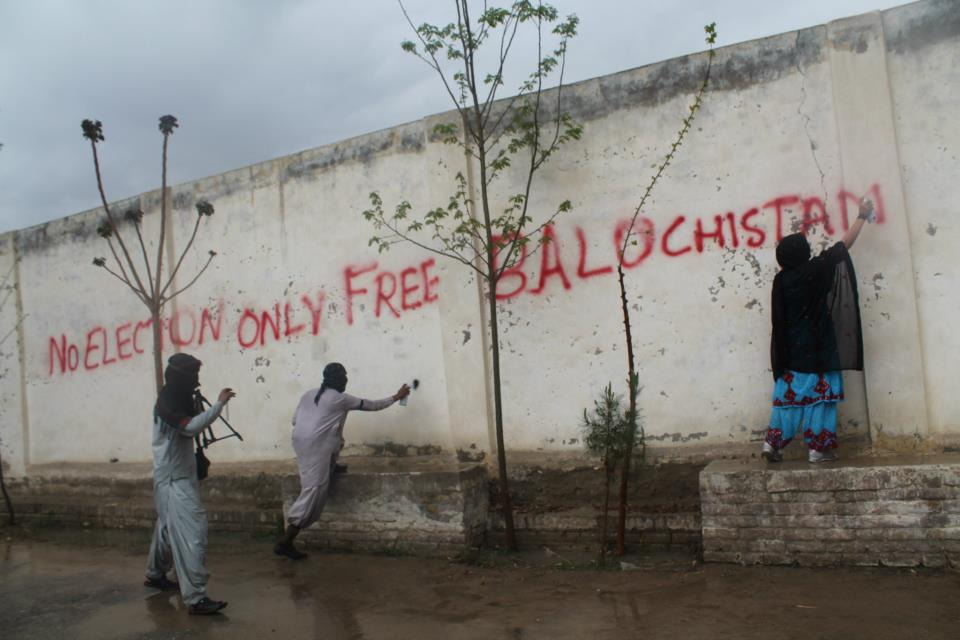
Baloch National Movement (BNM) has called upon to observe 27th March as a Black Day. The spokesperson of Baloch National Movement, in a statement, said, “Like in the past years, this year also we will observe 27th March as Black day. All zones of the Baloch National Movement will organize reference programs in Balochistan as well as at the international level in Germany, Netherlands, Australia, South Korea, England, and Canada. BNM’s different zones will demonstrate and protest.”
The BNM spokesman said that 27th March, 1948 will always remain etched in the Baloch history. On this day, Pakistan had occupied the newly formed state of Balochistan, which had its own history of thousand years, through brute military power and after that Pakistan turned the Baloch nation into its colony. From this day Baloch national identity, its culture, traditions and high moral values fell prey at the hands of a state that completely lacks history and culture. The sole purpose of the formation of a state like Pakistan was to safeguard the vested interests of the West.

The spokesman of Baloch National Movement (BNM) also said that from 27th March 1948 Pakistan has caused destructive impact on Baloch history, culture, and tradition. “On this day we lost our freedom and were forced to live a wretched life of slavery. The living and active nations never forget the days of national significance, rather observe it with the fullest intensity and draw policies according to the requirements and importance of such occasions. Therefore it is our national responsibility to educate our youth and the world about the historical significance of 27th March. On 27th March 1948, Pakistan occupied Balochistan and turned us into colonized people. Hence, the Baloch nation rejected the occupation of Balochistan and has been struggling against Pakistani occupation from the very first day. This national movement of the Baloch nation has gone through several ups and downs, and it is still going on with fullest vigor towards its cherished destination. The Baloch nation has offered infinite sacrifices in this journey; the series of sacrifices will continue until the final destination of national liberation.”
He added that Pakistan had been targeting political activists, social workers, students, professors, doctors, engineers, lawyers, literary persons and people from all fields of life in order to crush the national struggle and enslave Baloch nation for eternity. Thousands of Baloch have been martyred and thousands more had been enduring the atrocities and inhuman torture in the custody of the Pakistani Army.
“Today Baloch nation is facing an all out genocide which has continued in different ways from the first day of the occupation of Balochistan.”
The BNM spokesman further explained: “The ruler of Balochistan Mir Ahmedyar Khan on 11th August 1947 announced the freedom of Balochistan from the British empire that was broadcast by All India Radio Delhi and on 12th August 1947, New York Times also published this news of the freedom of the State of Kalat (Balochistan). After the fourth day of the freedom of Balochistan, on 15th August 1947, Britain declared the independence of subcontinent while creating two different states India and Pakistan,”

“The ruler of Balochistan, Khan of Kalat revived the old traditional system of ruling through establishing a bicameral parliament, Dewan-e- Aam (House of Representatives) and Dewan-e-Khas (House of Lords) by following the cabinet system of Great Britain. Meanwhile, Mohammad Ali Jinnah having the backing of Britain started exerting pressure on the state of Kalat to join Pakistan. In this regard, the first parliamentarian session of the lower chamber of Balochistan was convened in Dadar in order to discuss the question of accession to Pakistan between 12th to 15th December 1947. Balochistan’s House of Representatives (Dewan-e-Aam) unanimously rejected the idea of accession to Pakistan. Similarly, Dewan-e-Khas (House of Lords) rejected the motion of joining Pakistan on 4th January 1948. The Parliament of Kalat in its second session on 27th February 1948 once again rejected the idea of joining Pakistan.”
He further added, “After this Pakistan sent its regular army into Balochistan and occupied Balochistan by brute military force on 27th March 1948. Baloch nation opted to resist this military aggression of Pakistan which has continued as one of the extremely successful resistance movements till today.”

He said, the Baloch nation is known for its hospitality, bravery, resilience, secularism, religious tolerance and abiding by agreed accords. The Baloch nation has always resisted the foreign invaders and struggled against the expansionists. The historical event of resistance against Alexander, Iranian empires, Arabs, Mongols, and Central Asian invaders are a golden part of our history of resistance. This is the reason Balochistan has always been a hard nut for the foreign invaders to chew.
He explained further: “On 13th November 1839 under the leadership of Major Wilshire, the British Army attacked Kalat. But the ruler of Balochistan instead of surrendering to the British Army opted to resist the advancing army and preferred martyrdom. Even amidst the intrigues of British, Balochistan maintained its existence and sovereignty till 27th March 1948. But the British remain successful in dividing India into two parts. They needed a client state in this region to protect their interests in the future. They remained successful in galloping Muslim League and Mohammad Ali Jinnah as their pawns that successfully worked in their favour.”
History witnesses Pakistani occupation of Balochistan through the conspiracy of Britain. It is also the hard part of history that during the conference of 4th August between the ruler of Balochistan and Viceroy of India, the leaders of Muslim League, Mohammad Ali Jinnah and Liaquat Ali Khan were also present where the freedom of Balochistan (State of Kalat) and the return of British Balochistan were discussed. As well as the position of Balochistan was kept separated from the other states of India and Balochistan was declared a separate sovereign state.
The spokesperson of BNM said that Baloch nation observes 27th March as Black Day every year, because this day Pakistani Army stormed into Balochistan and forcefully occupied Balochistan on 27th March 1948 against the wishes of the people of Balochistan. “We have lost our national identity after becoming a colony of Pakistan. Not only we have been deprived of our motherland, but also soon after the occupation of Balochistan Pakistan Army set on atrocities and genocide of a Baloch nation.”
Previously Baloch nation has gone through four waves of national genocide, the fifth waves of Baloch national genocide has started with the beginning of the 21st century. In comparison, to the previous episodes, this phase of the Baloch national genocide is much more intense and extended. Thousands of Baloch are killed and thousands more lie in the custody of the Pakistani state and millions of people have been forced to migrate. But unlike past, this time the Baloch nation is more committed and determined in its struggle to attain national freedom. This is the obvious symbol of the love and sacrifice of the Baloch nation for the freedom of their motherland.
“Baloch National Movement (BNM) will run an online campaign on social media while using the hashtag of #27MarchBlackDay. It is an appeal to all social media users and human rights activists to take part in this online campaign,” the BNM spokesperson said.
